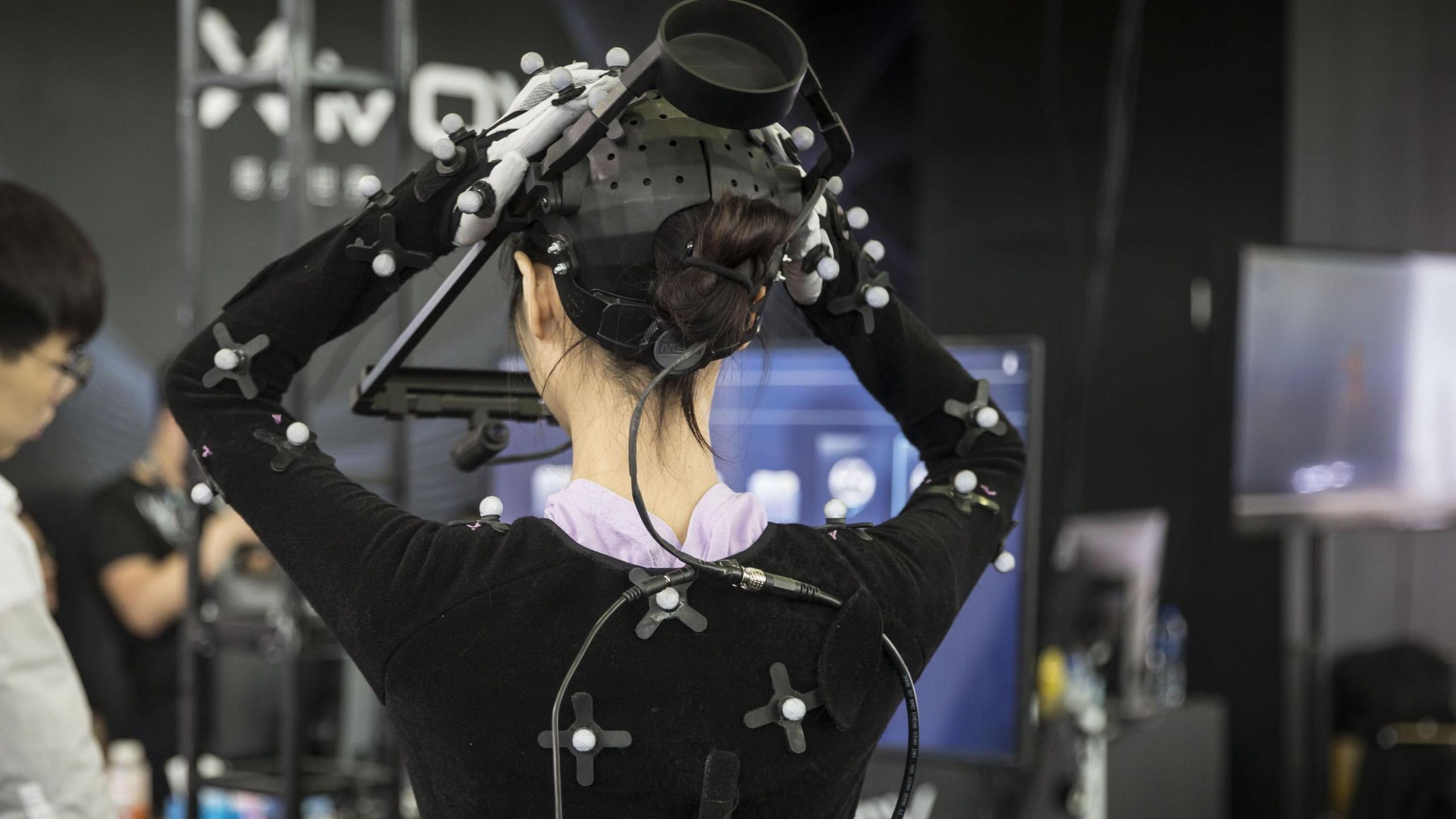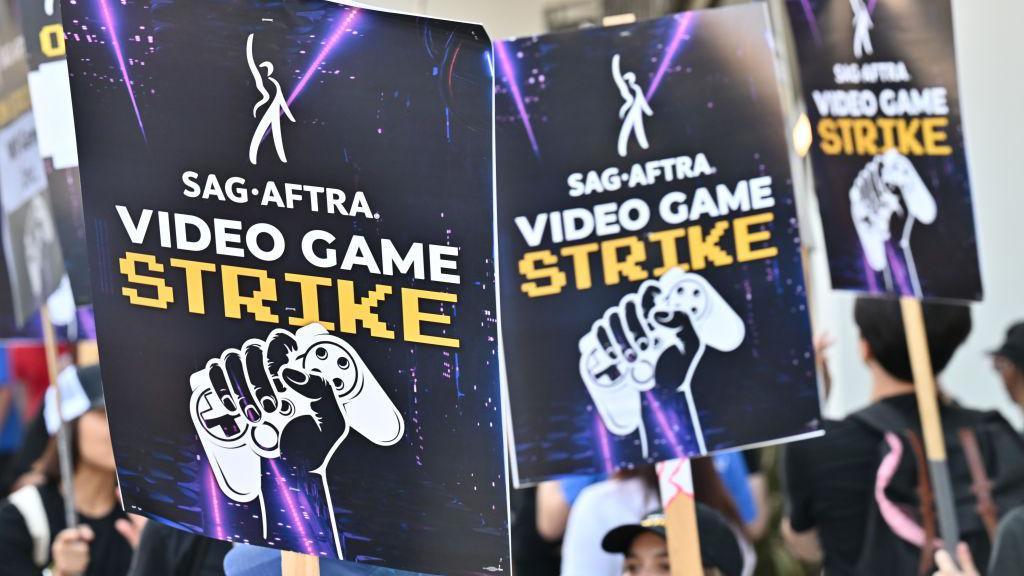Actors demand action over 'disgusting' explicit video game scenes

- Published
Performers working in the games industry have spoken of their distress at being asked to work on explicit content without notice, including a scene featuring a sexual assault.
Sex scenes are common in modern games - and are often made by filming human actors who are then digitised into game characters.
But performers have told the BBC a culture of secrecy around projects - where scripts are often not shared until the last moment - means they frequently do not know in advance that scenes may involve intimate acts.
They describe feeling "shaken" and "upset" after acting them out.
Performing arts union Equity is demanding action from the industry - it has published guides on minimum pay, and working conditions in games, external, including on intimate or explicit scenes.
'I just found it disgusting'
Jessica Jefferies is a professional casting director, who works mainly in video games and enjoys the medium.
Prior to that she was a motion capture performer - part of a small group who worked regularly for studios used by game developers.
Dressed in a skin-tight body suit, covered in markers, motion capture performers act-out the movements of characters in games on a large unfurnished set, where their motions are recorded digitally.
She said performers were often left in the dark about the nature of the game, or the scene, by developers.
"We'd get an email or a call from a studio saying we need you on these days for a shoot," she said.
"That was all the information we'd get."
Ms Jefferies told the BBC she was once asked to act out a scene with a male performer involving a sexual assault with no prior warning.
"I turned up and was told what I would be filming would be a graphic rape scene," she said.
"This act could be watched for as long or as little time as the player wanted through a window, and then a player would be able to shoot this character in the head.
"It was just purely gratuitous in my opinion."
She refused to act out the "disgusting" scene - which was made worse as she was the only female on set.
"There's no nudity involved, but its still an act and there's an intimacy in that act and also a violence in this situation," she said.
"So yes there may be a layer of Lycra between us, but you are still there and still having to truly immerse yourself in this scene."
In the end her concerns were listened to and the scene was not recorded.

Actors use motion capture suits like this one when performing for video games (Ms Jeffries is not pictured)
But it reinforces her belief that performers should know in advance about explicit scenes so they don't have to "kick up a fuss" on set or feel pressure to do something which makes them feel uncomfortable.
Ms Jefferies was consulted by Equity in the development of their guidance which requires that when recording explicit or intimate scenes:
A summary of the story, scene breakdown and scripts should be distributed to all cast members in advance.
performers should be able to request a closed set where access is kept to a minimum.
a competent intimacy coordinator should be engaged.
She argues giving actors more information will help them deliver better performances and argues "there is an appetite for change".
Ms Jefferies stresses the guidelines are not trying to put boundaries on storytelling. In the ten years since that incident there have also been major improvements, she says - and "these guidelines are just to bring it even more in line with the best practices in the film and TV industry".
She says the studios she now works with are generally very open to being educated on good practices, and agree that treating people well leads to better performances.
'Incredibly uncomfortable'
One voice actor and Equity member who supports the guidelines, speaking on condition of anonymity, also told the BBC of problems she had encountered.
She "absolutely loves the industry" but argues the limited information shared with actors before a performance needs to change.
"We have to sign NDAs [non-disclosure agreements], we're told almost nothing," she said.
In one recording for a major game she first learned it was explicit only when she turned up for work.
"This was actually a full-on sex scene," she said.
"I had to [vocally] match the scene and through the glass in the booth was the entire team, all male, watching me.
"It was excruciating... at that stage I had been in the games industry a while, and I had never felt so shaken".
She compared the experience to unexpectedly being required to perform for a premium rate phone-sex line.
"What upset me so much about the situation is I was put on the spot, nobody thought to ask me if I was ok with it, and nobody checked to see if I was ok afterwards," she said.
And as a freelancer, she feared being labelled as a troublemaker by refusing.
"Nobody has to justify why they're not hiring you," she said.
Like Ms Jefferies, she wants games to move closer to standards in film and TV.
'Getting it right'
Rhiannon Bevan of game news site The Gamer has covered the steps, external last year's gaming blockbuster Baldur's Gate 3 took in dealing with explicit scenes as an example of a modern game "getting it right".
She says games are increasingly taking explicit scenes seriously "and not just using them for titillation".
But it came with the risk that performers may not be comfortable with the work.
Baldur's Gate 3 addressed this by employing intimacy co-ordinators - dedicated members of staff tasked with ensuring the well-being of performers in explicit scenes.
Its developer used one intimacy co-ordinator to look after performers voicing intimate scenes, while another looked after those who were also miming actions to be digitised into the game.
As well as intimate scenes, the Equity guidelines also cover the overuse of NDAs, safety during motion and performance capture, avoiding harmful vocal stress for artists and the protections around the use of artificial intelligence.
AI use is one of the key issues behind a continuing strike by games performers in the US.
UKIE, the trade body for the games industry, did not respond directly to the issue of the treatment of performers working on explicit material, but said in relation to Equity's guidelines that its focus "remains on fostering a supportive environment for all stakeholders in the UK video game sector, ensuring it remains the best place to create, play, and sell video games".
- Published7 August 2024
